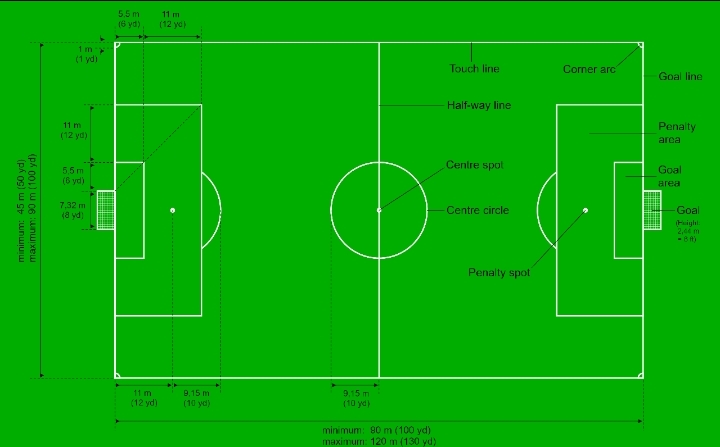1. Confidence Enables Players to Perform at Their Best
Confidence is perhaps the most critical factor that determines whether football players can perform at their highest level and utilize their full potential on the field. When players have a strong sense of confidence in their abilities, they can execute plays, skills, and tactics effectively during games. Confidence allows them to tap into talents and strengths they may not even realize they possess.
Confident football players can get into a flow state during games, in which they feel fully immersed in the moment. They do not overthink or second-guess their actions. Confidence suppresses nerves and anxiety during high-pressure situations like big games or close scores. Confident players can minimize mistakes and bounce back quickly from the few mistakes they make. Their belief in themselves remains high throughout the games.
In contrast, players with low confidence are more hesitant and error-prone. A lack of confidence leads to tentative play, indecisiveness, and frustrating mental lapses. Without confidence, players simply cannot reach their full potential on the field and end up underperforming relative to their skill levels. Great performances are fueled by great confidence.
2. Confidence Contributes to Consistency
In football, consistency is a highly valued attribute. The ability to maintain a high level of play consistently throughout games and long seasons is critical to individual and team success. Confidence is a key factor that enables such consistent performance.
Confident players can sustain focus, effort, and skill execution consistently for all 4 quarters of games. Their belief in themselves remains steadfast regardless of the game situation or score. Confidence allows them to quickly flush out poor plays or mistakes without negatively impacting subsequent plays. Rather than dwelling on setbacks, confident players maintain poise and immediately refocus on the next play.
This mentality produces consistent excellence from confident players week after week, season after season. Their performance does not fluctuate drastically between games based on outcomes and results. Confidence provides an emotional steadiness and resilience that translates into remarkably consistent on-field performance.
In contrast, players with low confidence are prone to wild swings in performance. Their lack of belief in themselves is evident in inconsistent effort, focus, and execution. Minor setbacks or failures can send their confidence spiraling and performance plummeting. The wavering nature of their confidence leads to remarkably inconsistent play.
Football teams need players who bring their A-game consistently to succeed. Confidence is what separates the consistent studs from the unreliable duds.
3. Confidence Helps Overcome Adversity
Football is a sport that inevitably involves a lot of adversity, challenges, and setbacks. From injuries to tough weather conditions to unlucky bounces to losing streaks – adversity is inevitable for a season. When adversity strikes, confidence is what enables teams and players to overcome and bounce back from it.
Confident players view adversity as temporary, isolated setbacks rather than monumental failures or catastrophes. Their belief in their abilities provides resilience in the face of challenges and hurdles. Confident players know they have the skills, work ethic, and support system to overcome adversity. After injuries, they attack adversity head-on with eager determination rather than dread or hesitation.
Confident teams rally around injured or struggling players rather than fracturing and turning on each other when adversity hits. They maintain composure and continue executing at a high level even when luck turns against them. Their confidence provides the mental toughness required to overcome almost any challenge or obstacle thrown their way.
In contrast, teams and players with low confidence are often crushed by adversity. They lack the resilience and mental fortitude to bounce back from setbacks and challenges. Adversity exposes their lack of self-belief and exacerbates factors like low morale, poor chemistry, and lack of trust. For low-confidence teams, adversity often becomes a downward spiral of negativity and failure.
4. Confidence Enhances Motivation
Motivation and effort are directly tied to confidence in football. Players who have strong self-belief can maintain high motivation levels during games and practices. Their confidence propels them to give maximum effort at all times and strive ceaselessly for improvement.
Confident players derive motivation from their belief in their abilities. They are eager to showcase their skills and talents on the field. Practices become opportunities to improve rather than chores to dread. Confident players set lofty goals for themselves and are internally driven to put in the work needed to achieve them. Their motivation comes from within rather than requiring excessive external validation or recognition.
In contrast, players struggling with confidence issues often have motivation issues as well. A lack of belief in themselves leads to lethargy, disinterest, and spotty effort. They are more focused on avoiding mistakes and failure than achieving success. Low confidence sucks the inherent joy out of football and turns practices into going-through-the-motions chores.
Great coaches understand that cultivating confidence is the key to unlocking motivation. Teams united in their confidence and belief in the team’s potential possess a supremely motivational dynamic. Confidence and motivation enjoy a mutually reinforcing relationship – each enhances the other.
5. Confidence Allows Playing Free of Fear
Fear and tentativeness restrain excellence in football. The most confident players and teams can play boldly and aggressively without internal restraints such as fear. Their belief in themselves allows them to play free of fear and hesitation on the field.
Confident players do not shy away from contact or play tentatively. They do not second guess their instincts due to fear of mistakes or failure. Confidence suppresses fearful thoughts and allows for free-flowing, fierce play. Confident players embrace risks and challenges on the field rather than withdrawing from them.
Teams overflowing with confidence play with daring creativity rather than rigid risk aversion. They do what it takes to win rather than what it takes to avoid losing. Their mentality is focused on making plays rather than avoiding errors. For the most confident teams, no deficit is too large and no opponent is too daunting.
In contrast, fear-ridden teams play anxiously. Their tentative play leads to mounting mistakes and passive, reactive play. Fearful players obsess over avoiding errors and judgment rather than making bold, game-changing plays. Teams needing more confidence stifle their potential due to internally imposed limitations.
Confidence casts out fear and unlocks greatness. The most confident teams and players perform at extraordinary levels because they are liberated mentally and emotionally. Their self-belief overrides fear and propels optimal performance.
6. Confidence Inspires Teammates
Confidence is contagious. The presence of visibly confident players has a way of inspiring and uplifting entire teams. Teammates naturally draw motivation and belief from the confidence of fellow players.
The attitudes and body language of the most confident players rub off on others. Their demeanor conveys the sense that victory is assured. Confident players raise the confidence level of the entire team. Other players feel more optimistic about their prospects and reassured by the presence of confident teammates.
Vocal confident leaders who positively reinforce and encourage teammates are invaluable. Their confidence helps minimize frustration and despair when the team faces adversity. Their body language never conveys doubt or defeat regardless of the score.
Great coaches know the importance of identifying and empowering the most confident players. Their confidence permeates the entire team and elevates everyone’s belief and performance. Confident leaders provide an emotional anchor that players can rally around.
Conversely, the presence of overtly insecure or pessimistic players dampens team morale and confidence. Their negativity and uncertainty are toxic. Great care must be taken to limit the influence fearful players have on the team mentality. Isolation or removal of such players may be necessary.
7. Confidence Intimidates Opponents
There is an intimidation factor that visibly confident teams impart on opponents. Opposing teams often get unnerved or shaken when matched up against teams overflowing with confidence and bravado.
The body language, energy, and demeanor of highly confident teams plant seeds of self-doubt and anxiety in opponents. It gives them the sense that defeat is inevitable against a team with such strong self-belief. Confident teams gain a psychological edge before the ball is even snapped.
Overtly confident players have a knack for getting into opposing players’ heads. Their swagger and brashness can cause mistakes and tentativeness. Excessive celebrations are aimed at destroying the confidence of opponents.
When a team has a strong belief in their capabilities relative to the opponent, it shows. Their confidence is written all over their pre-game demeanor and energy. This intimidation factor provides an edge that confident teams leverage to their advantage.
In contrast, tentative or scared teams are like blood in the water for confident opponents. Their obvious self-doubt only bolsters the opponent’s confidence. There is a predatory mentality that confident teams can develop when facing inferior, doubtful opponents.
The intimidation factor makes developing team confidence a priority. Coaches aim to build up their players while exposing the self-doubt of opponents. Confidence is demoralizing and intimidating.
8. Confidence Allows Playing Aggressively
Optimal football performance requires aggressive, fierce play. Confidence provides the courage and conviction needed to play with controlled abandon. Tentative play leads to passive play and errors.
Confident players attack each play as an opportunity to impose their will and talent. Their confidence allows full energetic exertion without hesitation or restraint. Confident teams play with a boldness aimed at overpowering opponents and dictating the terms of battle.
Confident players run crisper routes, block more physically, tackle more fiercely, and pursue more tenaciously. Their self-assurance translates into highly assertive play on both sides of the ball. Confidence provides the courage needed to capture contested balls, withstand big hits, and deliver punishing blows.
In contrast, conservative, tentative play is characterized by half-speed effort and passive play is detrimental. It leads to losing the physical and mental battle. Great coaches instill attitude and confidence that facilitates optimal aggressive play within the rules.
The most confident teams often physically and mentally wear down opponents. Their energetic, fierce style backed up by belief in themselves overwhelms inferior opponents by the 4th quarter. Confidence transforms into high-octane, aggressive playmaking.
9. Confidence Improves Resilience
Resilience is defined as the ability to quickly recover or bounce back from setbacks and adversity. Confidence is crucial for building resilience in football players and teams. Players who believe in themselves and their team can quickly flush out poor plays or games and immediately refocus.
Confident players do not dwell on mistakes, blame others, or grow discouraged by failure. Because they believe in their abilities, they maintain composure and poise even during rough stretches of play. Their confidence provides the mental framework to bounce back from temporary setbacks.
Likewise, confident teams can overcome issues like infighting, complaining, and finger-pointing after losses or poor play. Their collective confidence in the team provides perspective and instills resilience. Teams united in confidence trust their ability to regroup and refocus.
In contrast, teams and players lacking confidence are prone to complete meltdowns following mistakes and failure. Their lack of poise and mental toughness is evident. Minor setbacks snowball into disastrous stretches because confidence is missing as a stabilizing force.
Resilience is essential for sustaining high performance over long seasons. Confidence supplies the platform of self-belief that minimizes damage caused by inevitable mistakes and failures. It enables continuous improvement grounded in resilience.
10. Confidence Contributes to a Winning Mentality
Ultimately, confidence leads to developing a winning mentality marked by tenacity, resilience, and competitive greatness. Teams overflowing with belief in their abilities sustain a contagious mentality that separates them from mediocre teams.
Confidence breeds optimism, mental toughness, and competitive zeal. Confident teams expect to win and are undaunted by deficits or talented opponents. They play with a relentless mentality focused solely on winning games. This supreme confidence is the foundation for achieving elite, championship-level success.
Losing streaks and sustained losing do not shatter the confidence of winning teams. They maintain faith in their abilities and can turn around slumps faster than teams lacking confidence. For truly confident teams, building a culture of confidence eliminates self-doubt and instills a winning mindset.
Great coaches and leaders prioritize instilling authentic, earned confidence that is grounded in preparation and trust between teammates. There are no shortcuts to building confidence. But for teams able to build it, the benefits of a winning mentality fueled by confidence are immense. Mental fortitude separates the great from the mediocre.
Conclusion
In closing, confidence has a truly transformative effect individually and collectively in football. It unlocks potential, increases resilience, motivates effort, inspires teammates, intimidates opponents, and leads to sustained excellence. Confidence powers winning – the final metric that matters most.
In football, confidence is king. There is no substitute for the performance-enhancing, adversity-conquering power of confidence. Teams and players overflowing with self-belief have an insurmountable competitive advantage over less confident opponents.
Author







